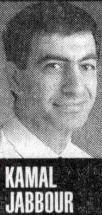

US Men's Marathon Olympic Trials
One Goal: Sydney
Published May 1, 2000 in The Post-Standard.By Dr Kamal Jabbour, Contributing Writer
Next Sunday May 7, 2000, the City of Pittsburgh hosts the US Olympic trials in the marathon. The top three finishers will travel to Sydney, assuming that they have also met the Olympic qualifying standard of 2 hours and 14 minutes. Qualifying for the trials required running the marathon in under 2:22. Those runners who ran faster than 2:20 get expense-paid trip to Pittsburgh.
Runners with local ties include former Chittenango runner Jerry Lawson who qualified in a time of 2:19:33 at the Virginia Beach Marathon in March, Mendon's Scott Bagley who qualified in 2:19:49 at the California International Marathon in December, Cicero's Kevin Collins who qualified in 2:19:50 at the Chicago Marathon in October, and Fayetteville's Jeff Morganti, an electrical engineer, who qualified in 2:22 at the Scranton Marathon.
Another qualifier with local ties is Terrence Mahon, the husband of former Liverpool running sensation Jennifer Rhines. Mahon qualified in 2:17:09 at the Austin Marathon in February. The most famous qualifier may well be David Honea. An electrical engineering graduate student at North Carolina State University, Honea became famous for winning $250,000 on the nationally-televised game show "Who wants to be a millionnaire?"
The competition for spots on the Olympic team may come down to the final miles of the race. Only David Morris, the American record holder and the prohibitive favorite with a qualifying time of 2:09:32, has run under 2:10 in the past year. Three minutes separated the next ten qualifiers who ran between 2:12:31 and 2:15:33, promising a lot of excitement.
Morris, 29, was born in Eagle River Alaska. He ran at the University of Montana, where he graduated with a degree in computer science. He finished tenth at the 1996 Olympic trials with a time of 2:16:20. In 1998, Morris relocated to Japan in search of discipline in his training. He finished third at the 1998 U.S. Marathon Championships in Pittsburgh in a personal best of 2:15:25. In 1999, he won the Japanese All-Corporate Half-Marathon in 1:02:00, in preparation for his fourth place finish in Chicago in an American record of 2:09:32.
Veteran runner Keith Brantly, 37, won the 1998 US Marathon championship in Pittsburgh in 2:12:31, giving him the second fastest qualifying time. An Illinois native, Brantly was a successful track runner at the University of Florida with a 10,000-meter personal record of 28:10.1. His track speed translated into consistent marathon performances, with a 2:14:16 fourth place finish in the 1992 trials, 2:12:59 in the 1993 New York City Marathon, 2:13:00 in the 1994 Boston Marathon, and 2:13:22 third place finish in the 1996 Olympic Trials Marathon.
Another computer scientist, 33-year-old Rod De Haven qualified for the trials with a 2:13:02 run at the 1998 Chicago Marathon. With a 28:06 best in 10,000 meters and 1:02:40 in the half-marathon, De Haven has the experience and the potential to pull an upset in Pittsburgh.
Joe LeMay, 33, is the only other qualifier to meet the Olympic A standard with his 2:13:55 victory at the California International Marathon. An aerospace engineer from Princeton, LeMay lives and runs in Danbury, CT. Married to ultra-marathon runner Ellen McCurtin, LeMay's training includes 150-mile weeks, proving the old adage that running volume translates into race victories.
Not to be dismissed, Todd Williams, 31, has the best track credentials with a 27:31.34 best in the 10,000 meters, the fastest active American. Williams' marathon debut of 2:11:17 in the 1997 Chicago Marathon proves that he can influence the outcome of these trials.
With so many engineers and computer scientists in the field, these trials promise a calculated tactical race that may not unfold until the final stretch.
Missing from the trials will be Khalid Khannouchi. The winner of the Chicago marathon in a world-record holder of 2:06:05, Khannouchi is a permanent resident of the US, anxiously awaiting his citizenship. At this point in the process, it is unlikely that he will wear the star and stripes in Sydney in October.
In keeping with tradition, NBC network television bought and shelved the rights to broadcast the race, denying again the American public a chance to watch and celebrate our true heroes.
Kamal Jabbour runs and writes on the hills of Pompey, New York. His RUNNING Column appears in The Post-Standard on Mondays. He maintains TrackMeets.com, the world leader in live track webcasting, and receives email at jabbour@syr.edu.
